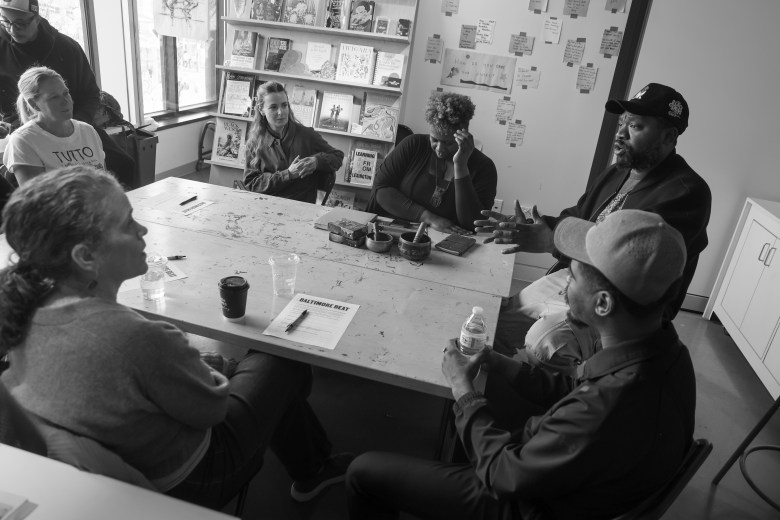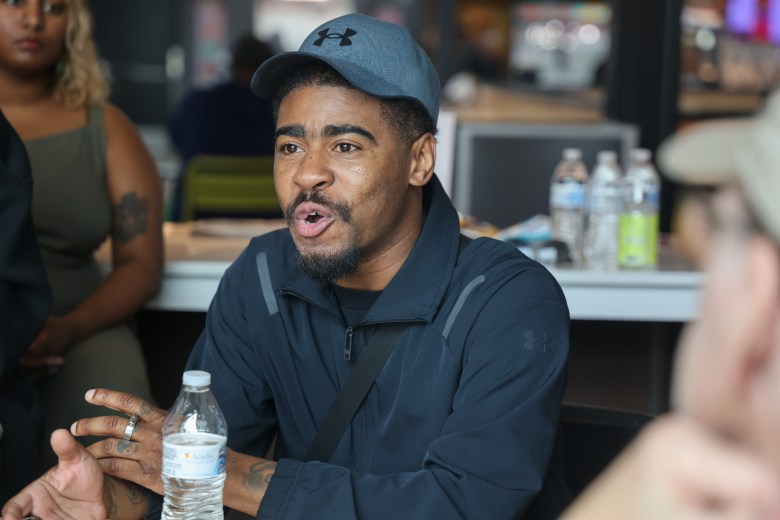Baltimore Beat partnered with the Baltimore Museum of Art to talk about the 10 years that have passed since Freddie Gray’s death and the unrest that followed. From February 28 until April 4, we stationed ourselves at the museum’s space at Lexington Market to have conversations with anyone who was willing about these very important events, and what they meant to city residents. We didn’t do it alone. Artists and experts like Devin Allen, Ray Kelly of the Citizens Policing Project, and members of the Arch Social Club stopped by, too.

Photo credit: Myles Michelin.
Here are a few of the stories we gathered during our time at the market.
Name: Michael Barnes
Neighborhood: Upton
Where were you when Freddie Gray’s death occurred? Lock-up in Jessup, Md.
What did the Baltimore Uprising change about your neighborhood? To start talking to the city about cleaning up the hood.
How old were you when the Uprising happened, and how were you changed by Freddie Gray’s death and the Uprising? I was 40 at the time and it [caused] me to take a look at the hood and the people in it and…never [take] any of it for granted.
In your opinion, has policing changed in Baltimore since the Baltimore Uprising? Yes it has a whole lot on both levels, positive and negative.
What would you like to see for the future of Baltimore? I would like all the people in our city to get along with each other. Police need to crack down on drug selling and using.
Name: Brandon Hatcher
Neighborhood: Baltimore City
Where were you when Freddie Gray’s death occurred? Baltimore City watching the news on television of this tragedy.
What did the Baltimore Uprising change about your neighborhood? It brought communities and organizations closer together.
How old were you when the Uprising happened, and how were you changed by Freddie Gray’s death and the Uprising? 25, and it showed how life can be taken for granted where we should all do our best to achieve all of our dreams and to never stop believing in yourself.
In your opinion, has policing changed in Baltimore since the Baltimore Uprising? Yes, it has changed tremendously.
What would you like to see for the future of Baltimore? More Uprising [education] events and activities.
Name: Nia Parks
Neighborhood: I lived on Braddish and North Ave.
Where were you when Freddie Gray’s death occurred? I heard about it from my family. I don’t remember my exact location, but I do remember what I felt and the almost immediate silence after I saw it on my phone.
What did the Baltimore Uprising change about your neighborhood? There was more fear. Less people came outside to play or sit on [their] porch for a while.
How old were you when the Uprising happened, and how were you changed by Freddie Gray’s death and the Uprising? I was a senior at Western High School. That was my first time thinking about the system and media to portray a certain viewpoint. I only thought about racism in terms of slavery I thought more about how media is created and how it is essential to understanding who it comes from.
What would you like to see for the future of Baltimore? Reparations — created by ourselves, continually using our voices and creativity to change/reframe the mainstream Baltimore narrative.

Photo credit: Myles Michelin.
Name: Kristan Appel
Neighborhood: Canton
Where were you when Freddie Gray’s death occurred? Home alone and listen to TV and radio and social media.
What did the Baltimore Uprising change about your neighborhood? More diversity in Canton. Efforts to remove vestiges of Captain O’Donnell, slave owner.
How old were you when the Uprising happened, and how were you changed by Freddie Gray’s death and the Uprising? 54 years old. I was elated that so much changed. So many barriers were broken. The police department got a lesson that took centuries to learn.
In your opinion, has policing changed in Baltimore since the Baltimore Uprising? Yes. I am a member of the Police Trial Board. I am seeing lots of change. It will take at least a generation to see major changes, however.
What would you like to see for the future of Baltimore? Equity in jobs, housing, schooling, healthcare. Fewer billionaires buying up our TV stations, newspapers, and office buildings.
Name: Jeremy Collins
Neighborhood: Dorchester
Where were you when Freddie Gray’s death occurred? I was a student at the illustrious Morgan State University.
What did the Baltimore Uprising change about your neighborhood? It shook the campus community. Many of us were already dismayed by Mke Brown and Ferguson, but to witness the brutality in our own city felt even more surreal.
How old were you when the Uprising happened, and how were you changed by Freddie Gray’s death and the Uprising? I was 19 going on 20. It radicalized me for sure. Pushed me into the Green Party when I was disgusted by the response from liberals/Democrats. I ultimately became a militant communist.
In your opinion, has policing changed in Baltimore since the Baltimore Uprising? Donnell Rochester was murdered recently. I’m unsure if I care much about policing when poverty is still an issue in this city. Crime and poverty are a bigger issue than policing. Has that changed im Baltimore? Not to a degree that matters.
What would you like to see for the future of Baltimore? A political revolution that centers people and care. Regardless of someone’s ability to pay or class status. The ghetto should be destroyed. Quality housing should be built. Dignified jobs. Healthcare.
